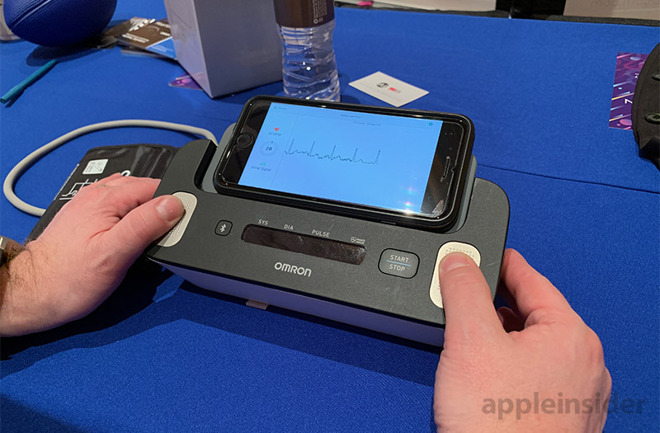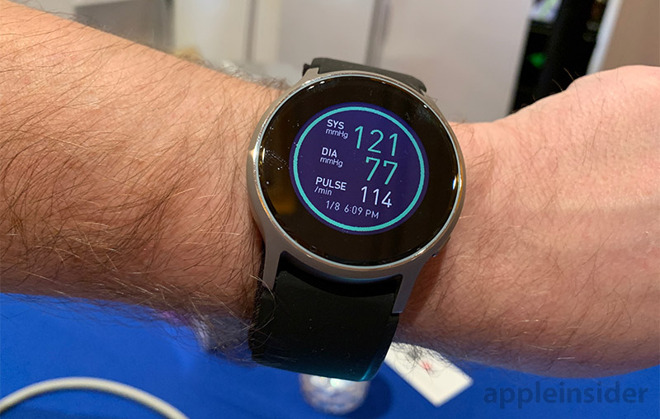Omron HeartGuide packs blood pressure monitor into a smartwatch, Complete BP monitor featu...
Omron showed off its latest wares at the ShowStoppers event at CES 2019 on Tuesday, including the HeartGuide wearable blood pressure monitor and an at-home BP monitor with EKG technology developed in partnership with AliveCor.
Omron claims HeartGuide is the first wearable blood pressure monitor to squeeze its complex components into a smartwatch-style form factor. The company says it filed more than 80 patents to realize the device, which contains parts and technology that miniaturize components required for oscillometric measurement.
Like traditional -- and much larger -- blood pressure measurement devices, HeartGuide relies on an inflatable cuff hidden in its band to facilitate readings. The process is thought to be more accurate than methods employed by other products which rely on solid-state sensors to provide blood pressure estimates.
A transflective, backlit display saves on energy, allowing Omron to build in general smartwatch features like email support, call and text notifications, health tracking, sleep tracking and more. Users can expect to charge HeartGuide two to three times a week, Omron estimates.

Omron Complete
In addition to HeartGuide, Omron this spring will release an at-home blood pressure monitor with built-in EKG capabilities. Called Complete, the device allows users to measure and store blood pressure and heart readings simultaneously. Readings can subsequently be shared with healthcare practitioners.
To bring the device to market, Omron partnered with AliveCor, the same company that delivered Apple Watch's first FDA-certified accessory in the Kardia Band EKG meter. Omron says the Complete utilizes advanced algorithms to detect atrial fibrillation, a leading cause of stroke.
Both the HeartGuide and Complete sync data with Apple's HealthKit through their respective mobile apps.
HeartGuide is available now for $499 through Omron's website. The Complete is currently under FDA review and is expected to ship in early 2019 for around $200.
AppleInsider is at the Consumer Electronics Show in Las Vegas from Jan. 8 through Jan. 11, where we're expecting 5G devices, HomeKit, 8K monitors and more. Keep up with our coverage by downloading the AppleInsider app, and follow us on YouTube, Twitter @appleinsider and Facebook for live, late-breaking coverage. You can also check out our official Instagram account for exclusive photos throughout the event.
Omron claims HeartGuide is the first wearable blood pressure monitor to squeeze its complex components into a smartwatch-style form factor. The company says it filed more than 80 patents to realize the device, which contains parts and technology that miniaturize components required for oscillometric measurement.
Like traditional -- and much larger -- blood pressure measurement devices, HeartGuide relies on an inflatable cuff hidden in its band to facilitate readings. The process is thought to be more accurate than methods employed by other products which rely on solid-state sensors to provide blood pressure estimates.
A transflective, backlit display saves on energy, allowing Omron to build in general smartwatch features like email support, call and text notifications, health tracking, sleep tracking and more. Users can expect to charge HeartGuide two to three times a week, Omron estimates.

Omron Complete
In addition to HeartGuide, Omron this spring will release an at-home blood pressure monitor with built-in EKG capabilities. Called Complete, the device allows users to measure and store blood pressure and heart readings simultaneously. Readings can subsequently be shared with healthcare practitioners.
To bring the device to market, Omron partnered with AliveCor, the same company that delivered Apple Watch's first FDA-certified accessory in the Kardia Band EKG meter. Omron says the Complete utilizes advanced algorithms to detect atrial fibrillation, a leading cause of stroke.
Both the HeartGuide and Complete sync data with Apple's HealthKit through their respective mobile apps.
HeartGuide is available now for $499 through Omron's website. The Complete is currently under FDA review and is expected to ship in early 2019 for around $200.
AppleInsider is at the Consumer Electronics Show in Las Vegas from Jan. 8 through Jan. 11, where we're expecting 5G devices, HomeKit, 8K monitors and more. Keep up with our coverage by downloading the AppleInsider app, and follow us on YouTube, Twitter @appleinsider and Facebook for live, late-breaking coverage. You can also check out our official Instagram account for exclusive photos throughout the event.


Comments
As for ECG wearables it's now "the thing" apparently with new entrants in the watch category. We can all not only worry needlessly, but more often and far more efficiently.